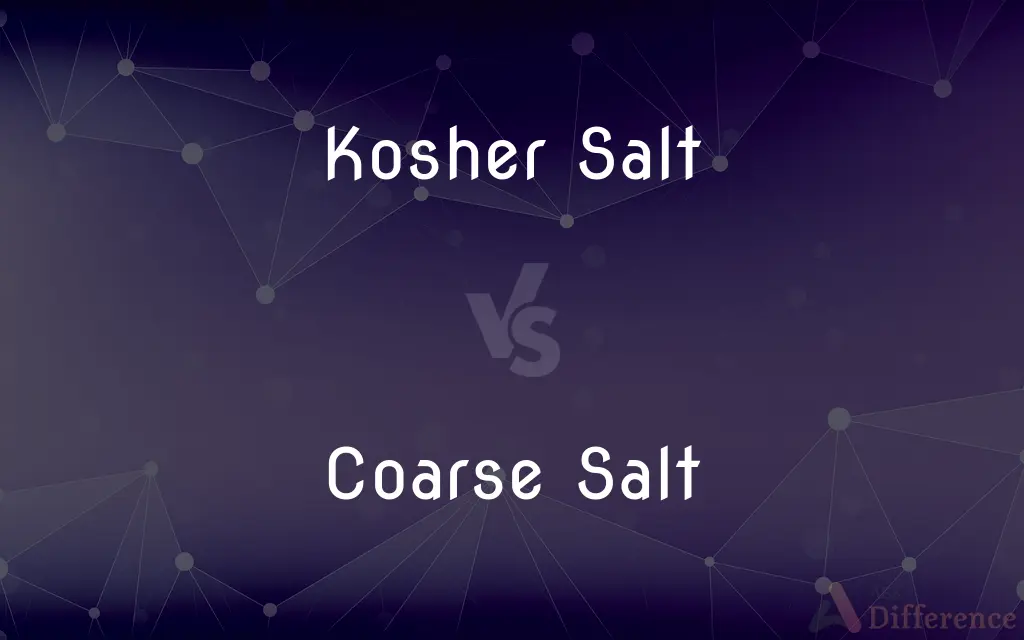Kosher Salt vs. Coarse Salt — What's the Difference?
By Tayyaba Rehman — Published on December 4, 2023
Kosher Salt is flaky and used in koshering; Coarse Salt features large, irregular grains and is mainly utilized for grinding or brining.

Difference Between Kosher Salt and Coarse Salt
Table of Contents
ADVERTISEMENT
Key Differences
Embarking on a culinary journey introduces one to varied ingredients, such as Kosher Salt and Coarse Salt, each possessing unique characteristics. Kosher Salt, notably used in the koshering process of meat by drawing out blood, is recognized for its flaky and light texture. Meanwhile, Coarse Salt, known for its larger, irregular granules, finds its usage significantly in grinds and brines, providing a robust salty punch when utilized in dishes.
Moving into the culinary specifics, Kosher Salt is often hailed for its ability to dissolve relatively quickly and distribute flavor evenly in recipes. Coarse Salt, due to its larger granules and subsequently slower dissolving time, tends to contribute to a burst of flavor, especially noted when it’s used as a finishing touch on dishes, offering a pronounced salty crunch in every bite.
Kosher Salt, given its name and application, has a notable history and utility in the Jewish culinary world, adhering to specific dietary laws. Coarse Salt doesn’t possess the same religious associations and instead finds its identity strongly rooted in varied culinary applications, often being a preferred choice for preserving due to its larger granule size.
In terms of availability and recognition in the culinary world, Kosher Salt stands out as a staple in many kitchens, recognized for its versatility and consistency in flavoring dishes. Coarse Salt, while perhaps not as commonly recognized as a kitchen staple, establishes its own niche, especially in specific applications like brining, where its ability to maintain structural integrity is celebrated.
Considering global cuisines and food preparation methodologies, Kosher Salt often finds itself seamlessly integrated into various recipes due to its consistent grain size and reliable flavor distribution. Coarse Salt, with its distinct texture and flavor profile, finds a particular home in specific culinary applications, where its texture and gradual flavor release are desired, such as in pretzel-making or salt-crusted dishes.
ADVERTISEMENT
Comparison Chart
Texture
Flaky and light
Large, irregular granules
Primary Usage
Koshering and general cooking
Grinding and brining
Dissolving Time
Relatively quick
Slower
Culinary Application
Versatile in many dishes
Specific applications
Associated Traditions
Jewish dietary laws
Not traditionally specific
Compare with Definitions
Kosher Salt
Kosher Salt tends to dissolve and distribute flavor evenly.
Using Kosher Salt in the soup ensured a balanced salty flavor.
Coarse Salt
Coarse Salt is often utilized for grinding purposes.
The mill was filled with Coarse Salt for tableside seasoning.
Kosher Salt
Kosher Salt does not leave a residual salty aftertaste.
The bread was flavorful without being overly salty thanks to Kosher Salt.
Coarse Salt
Coarse Salt maintains its structure in various culinary uses.
The Coarse Salt crust preserved the fish’s moisture and flavor during baking.
Kosher Salt
Kosher Salt is a staple in various global cuisines.
Chefs worldwide reach for Kosher Salt for its reliable consistency.
Coarse Salt
Coarse Salt is characterized by its large, irregular granules.
Coarse Salt was visibly speckled atop the freshly baked pretzels.
Kosher Salt
Kosher Salt is known for its light, flaky texture.
The chef sprinkled Kosher Salt over the steak for a quick seasoning.
Coarse Salt
Coarse Salt finds a particular place in brining applications.
The turkey soaked in a Coarse Salt brine to enhance its flavor.
Kosher Salt
Kosher Salt adheres to Jewish dietary laws for koshering meat.
To ensure the meat was kosher, it was covered with Kosher Salt.
Coarse Salt
Coarse Salt can provide a burst of flavor in dishes.
Biting into the Coarse Salt crystals offered a bold, salty crunch.
Common Curiosities
What is Kosher Salt typically used for?
Kosher Salt is often used in koshering meat and general cooking due to its flaky texture.
Is Kosher Salt only used in Jewish cuisine?
No, Kosher Salt is versatile and used in various global cuisines.
Can Kosher Salt and Coarse Salt be used interchangeably?
While they can sometimes be substituted, their textural differences can impact a dish’s outcome.
Why choose Coarse Salt for brining?
Coarse Salt is chosen for brining due to its larger granules and slower dissolving rate.
What is a notable visual feature of Kosher Salt?
Kosher Salt is noted for its visibly flaky and light crystals.
Can Coarse Salt be used for koshering?
Technically it can be, but traditionally, Kosher Salt is used due to its specific texture.
How does the taste of Kosher Salt and Coarse Salt compare?
Kosher Salt is mild and even, while Coarse Salt provides a more intense, localized flavor burst.
Why might a chef choose Kosher Salt for seasoning?
Kosher Salt is chosen for its ability to dissolve well and distribute flavor evenly.
How is Coarse Salt commonly used in cooking?
Coarse Salt is widely used for grinding, brining, and providing a textural salty burst in dishes.
Is Coarse Salt suitable for baking?
Yes, Coarse Salt is often used in baking, especially as a finishing salt for texture and flavor.
Does Coarse Salt dissolve quickly in dishes?
No, Coarse Salt generally dissolves slower due to its larger granule size.
Are Kosher Salt and Coarse Salt derived from different sources?
Both can come from either mined rock salt or evaporated sea salt, but processing differs.
Does Coarse Salt work well in quick-cooking dishes?
Coarse Salt may not fully dissolve in quick-cooking dishes, leaving a crunchy texture.
Is Kosher Salt available globally?
Yes, Kosher Salt is widely available and used in various global cuisines.
Can I replace Kosher Salt with Coarse Salt in baking?
Care should be taken as Coarse Salt may alter the texture and saltiness of baked goods.
Share Your Discovery

Previous Comparison
Universe vs. Solar System
Next Comparison
Hydroscopic vs. HygroscopicAuthor Spotlight
Written by
Tayyaba RehmanTayyaba Rehman is a distinguished writer, currently serving as a primary contributor to askdifference.com. As a researcher in semantics and etymology, Tayyaba's passion for the complexity of languages and their distinctions has found a perfect home on the platform. Tayyaba delves into the intricacies of language, distinguishing between commonly confused words and phrases, thereby providing clarity for readers worldwide.
















































